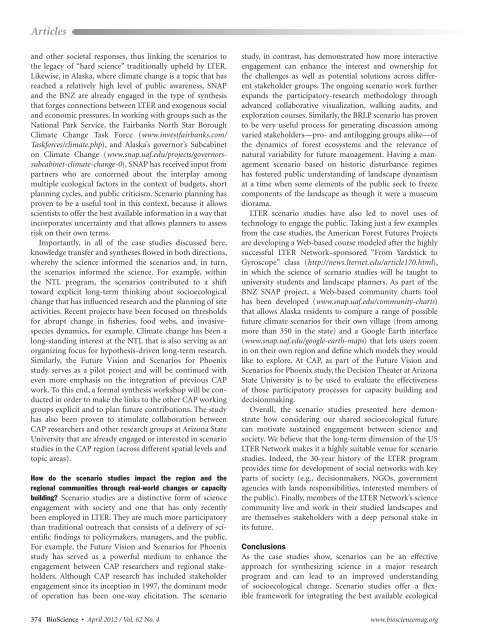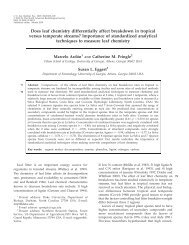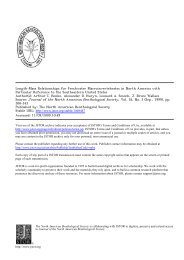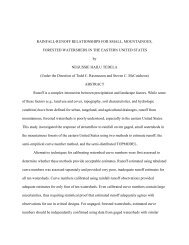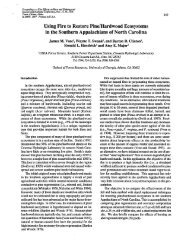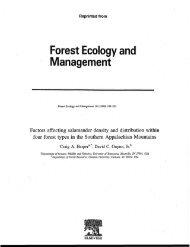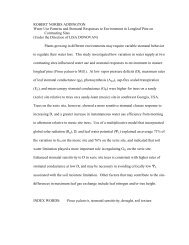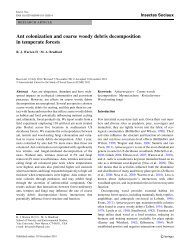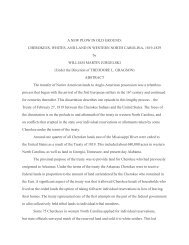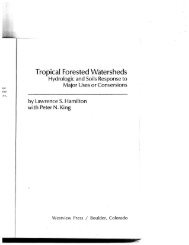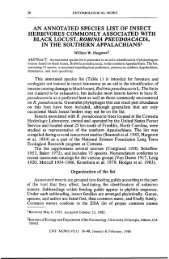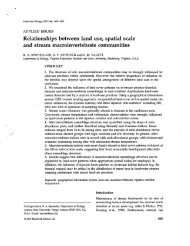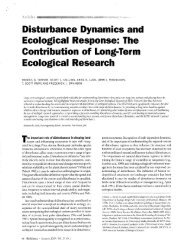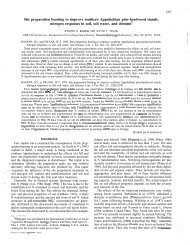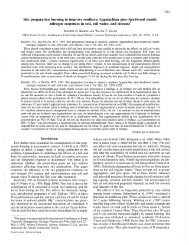biology join - Coweeta LTER - University of Georgia
biology join - Coweeta LTER - University of Georgia
biology join - Coweeta LTER - University of Georgia
You also want an ePaper? Increase the reach of your titles
YUMPU automatically turns print PDFs into web optimized ePapers that Google loves.
Articles<br />
and other societal responses, thus linking the scenarios to<br />
the legacy <strong>of</strong> “hard science” traditionally upheld by <strong>LTER</strong>.<br />
Likewise, in Alaska, where climate change is a topic that has<br />
reached a relatively high level <strong>of</strong> public awareness, SNAP<br />
and the BNZ are already engaged in the type <strong>of</strong> synthesis<br />
that forges connections between <strong>LTER</strong> and exogenous social<br />
and economic pressures. In working with groups such as the<br />
National Park Service, the Fairbanks North Star Borough<br />
Climate Change Task Force (www. investfairbanks.com/<br />
Taskforces/climate.php), and Alaska’s governor’s Subcabinet<br />
on Climate Change (www.snap.uaf.edu/projects/governorssubcabinet-climate-change-0),<br />
SNAP has received input from<br />
partners who are concerned about the interplay among<br />
multiple ecological factors in the context <strong>of</strong> budgets, short<br />
planning cycles, and public criticism. Scenario planning has<br />
proven to be a useful tool in this context, because it allows<br />
scientists to <strong>of</strong>fer the best available information in a way that<br />
incorporates uncertainty and that allows planners to assess<br />
risk on their own terms.<br />
Importantly, in all <strong>of</strong> the case studies discussed here,<br />
knowledge transfer and syntheses flowed in both directions,<br />
whereby the science informed the scenarios and, in turn,<br />
the scenarios informed the science. For example, within<br />
the NTL program, the scenarios contributed to a shift<br />
toward explicit long-term thinking about socioecological<br />
change that has influenced research and the planning <strong>of</strong> site<br />
activities. Recent projects have been focused on thresholds<br />
for abrupt change in fisheries, food webs, and invasivespecies<br />
dynamics, for example. Climate change has been a<br />
long-standing interest at the NTL that is also serving as an<br />
organizing focus for hypothesis-driven long-term research.<br />
Similarly, the Future Vision and Scenarios for Phoenix<br />
study serves as a pilot project and will be continued with<br />
even more emphasis on the integration <strong>of</strong> previous CAP<br />
work. To this end, a formal synthesis workshop will be conducted<br />
in order to make the links to the other CAP working<br />
groups explicit and to plan future contributions. The study<br />
has also been proven to stimulate collaboration between<br />
CAP researchers and other research groups at Arizona State<br />
<strong>University</strong> that are already engaged or interested in scenario<br />
studies in the CAP region (across different spatial levels and<br />
topic areas).<br />
How do the scenario studies impact the region and the<br />
regional communities through real-world changes or capacity<br />
building? Scenario studies are a distinctive form <strong>of</strong> science<br />
engagement with society and one that has only recently<br />
been employed in <strong>LTER</strong>. They are much more participatory<br />
than traditional outreach that consists <strong>of</strong> a delivery <strong>of</strong> scientific<br />
findings to policymakers, managers, and the public.<br />
For example, the Future Vision and Scenarios for Phoenix<br />
study has served as a powerful medium to enhance the<br />
engagement between CAP researchers and regional stakeholders.<br />
Although CAP research has included stakeholder<br />
engagement since its inception in 1997, the dominant mode<br />
<strong>of</strong> operation has been one-way elicitation. The scenario<br />
study, in contrast, has demonstrated how more interactive<br />
engagement can enhance the interest and ownership for<br />
the challenges as well as potential solutions across different<br />
stakeholder groups. The ongoing scenario work further<br />
expands the participatory-research methodology through<br />
advanced collaborative visualization, walking audits, and<br />
exploration courses. Similarly, the BRLP scenario has proven<br />
to be very useful process for generating discussion among<br />
varied stakeholders—pro- and antilogging groups alike—<strong>of</strong><br />
the dynamics <strong>of</strong> forest ecosystems and the relevance <strong>of</strong><br />
natural variability for future management. Having a management<br />
scenario based on historic disturbance regimes<br />
has fostered public understanding <strong>of</strong> landscape dynamism<br />
at a time when some elements <strong>of</strong> the public seek to freeze<br />
components <strong>of</strong> the landscape as though it were a museum<br />
diorama.<br />
<strong>LTER</strong> scenario studies have also led to novel uses <strong>of</strong><br />
technology to engage the public. Taking just a few examples<br />
from the case studies, the American Forest Futures Projects<br />
are developing a Web-based course modeled after the highly<br />
successful <strong>LTER</strong> Network–sponsored “From Yardstick to<br />
Gyroscope” class (http://news.lternet.edu/article170.html),<br />
in which the science <strong>of</strong> scenario studies will be taught to<br />
university students and landscape planners. As part <strong>of</strong> the<br />
BNZ SNAP project, a Web-based community charts tool<br />
has been developed (www.snap.uaf.edu/community-charts)<br />
that allows Alaska residents to compare a range <strong>of</strong> possible<br />
future climate scenarios for their own village (from among<br />
more than 350 in the state) and a Google Earth interface<br />
(www.snap.uaf.edu/google-earth-maps) that lets users zoom<br />
in on their own region and define which models they would<br />
like to explore. At CAP, as part <strong>of</strong> the Future Vision and<br />
Scenarios for Phoenix study, the Decision Theater at Arizona<br />
State <strong>University</strong> is to be used to evaluate the effectiveness<br />
<strong>of</strong> those participatory processes for capacity building and<br />
decisionmaking.<br />
Overall, the scenario studies presented here demonstrate<br />
how considering our shared socioecological future<br />
can motivate sustained engagement between science and<br />
society. We believe that the long-term dimension <strong>of</strong> the US<br />
<strong>LTER</strong> Network makes it a highly suitable venue for scenario<br />
studies. Indeed, the 30-year history <strong>of</strong> the <strong>LTER</strong> program<br />
provides time for development <strong>of</strong> social networks with key<br />
parts <strong>of</strong> society (e.g., decisionmakers, NGOs, government<br />
agencies with lands responsibilities, interested members <strong>of</strong><br />
the public). Finally, members <strong>of</strong> the <strong>LTER</strong> Network’s science<br />
community live and work in their studied landscapes and<br />
are themselves stakeholders with a deep personal stake in<br />
its future.<br />
Conclusions<br />
As the case studies show, scenarios can be an effective<br />
approach for synthesizing science in a major research<br />
program and can lead to an improved understanding<br />
<strong>of</strong> socioecological change. Scenario studies <strong>of</strong>fer a flexible<br />
framework for integrating the best available ecological<br />
374 BioScience • April 2012 / Vol. 62 No. 4 www.biosciencemag.org


